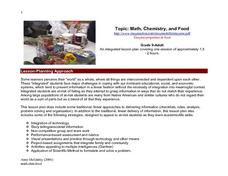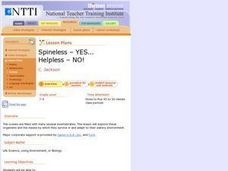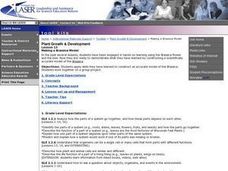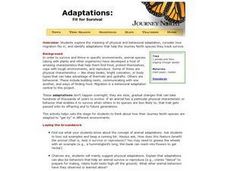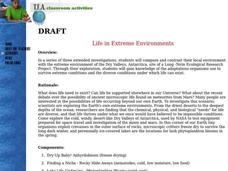Curated OER
Life for the First Inhabitants
Fourth graders study the contributions of the American Indian culture on the development of Utah. They examine and create American Indian rock art.
Curated OER
Health Wheel Self-Care Plan for Diabetics
Students help create a Health Wheel: a personal, inspirationally based, self-care plan for preventing or managing diabetes in daily life. They (student or client) researches the causes of diabetes, and creates a "health wheel" that...
Curated OER
Memory Game Art Project
Students create a memory game featuring the Arctic and, more particularly, the Arctic hare. They examine a few pictures on a website embedded in this plan in order to get an idea of the Arctic landscape and the activities of the Arctic...
Curated OER
Topic: Math, Chemistry, and Food
Students listen as the teacher tells the story of Sisyphus rolling the stone up the mountain. Students prepare two batches of jello, one with fresh pineapple, and one with canned pineapple. While the jello is setting, students work on...
Curated OER
Mold
Students explore mold, the different types and the health risks that they pose. In this mycelium lesson plan students grow different molds and see which type of foods mold the fastest.
Curated OER
What Do Snails Eat?
Students conduct a food choice experiment with snails, recording the results on a chart to determine what snails eat. In this what do snails eat lesson plan, students color a picture of snail anatomy, perform the experiment with 3...
Curated OER
Buckets of Bucks for World Hunger
Learners participate in a nonprofit organization activity for hunger outreach problems. In this service project lesson, students practice counting coins, complete a service project for a hunger outreach, discuss nutrition and healthy...
Curated OER
Endangered Ecosystems Grades 4-5
Students read about research at the field sites. They read field reports from team members at the site. Students conduct their own research on ecosystems in their lives. They explore and build an interactive food web. Students create...
Curated OER
Spineless - YES... Helpless - NO!
Students distinguish between invertebrate and vertebrate organisms while examining the zoological classes of a number of invertebrates. They illustrate a food web of these organisms and investigate the impact of humans on the oceanic...
Curated OER
INDUSTRY AND THE ENVIRONMENT
Seventh graders create a final project called Industry X (which was previously researched in the unit) has plans to build in town. There is a special town meeting scheduled to discuss this matter and allow everyone to express their...
Curated OER
Backyard Wildlife Conservation
Students survey local wildlife. They distinguish between permanent and migrating or seasonal species. Students identify species and describe the ecological niche. Students research the food chain and food web for the backyard...
Curated OER
Investigation Xylem
Students investigate how water travels up the stem of vascular plants by using food coloring to stain the xylem of a number of different plants. They know the function of leaves, stems, and root at the end of the experiment.
Curated OER
Making a Brassica Model
Students apply skills they have learned to construct an accurate model of the Brassica and then work together on a group project. They analyze how the parts of a system go together, and how these parts depend on each other. Finally,...
Curated OER
Let us Help
Students explore water conservation. For this ecology and civic responsibility lesson, students identify agencies that monitor and help improve water quality and describe what they do. Students research these organizations and work in...
Curated OER
Colored Drops
Students examine the properties of a liquid that contains water and food coloring and a liquid that contains water, food coloring and a liquid detergent. They interpret their data, describe properties, and make reasonable explanations...
Curated OER
Bivalve Biology
Pupils place clams into a beaker containing saltwater. They place a small drop of food coloring just above the shell. Students observe the movement of the food coloring. Clams are then placed into clean beakers of saltwater with 24 brine...
Curated OER
Adaptations: Fit For Survival
Young scholars track species using the Journey North project. They examine the meaning of physical and behavioral adaptation, migration, and identify adaptations that help the species they track survive.
Curated OER
How Would You Spend a Million Dollars?
Pupils plan and organize a theme to spend one million dollars. They select a theme, research prices of items on the Internet, organize the information into a spreadsheet, write an introductory paragraph, and create a final project.
Curated OER
Amazon Rainforest
Seventh graders complete a simulation in which they travel through the Amazon rainforest. Using their map skills, they determine the best route and where to see specific plants and animals. They develop their own database to organize...
Curated OER
Digestion and Nutrition
In this digestion learning exercise, learners will match 12 terms associated with the digestive system to their correct definition. The vocabulary words review the digestive system organs and their functions.
Curated OER
ORBIS Sight-Saving
In these eye care worksheets, students read about a nonprofit organization with the goal of eliminating preventable blindness called ORBIS. Students then answer five questions about the program and one short answer question.
Curated OER
Opening Lesson: Community
Students participate in a community service project and present an art project. In this lesson on community service, students read Rainbow Fish and discuss its meaning for them as it relates to community. Students create an art...
Curated OER
Life in Extreme Environments
Students compare and contrast local environments with the extreme environment of the Dry Valleys, Antarctica. Students explore and gain knowledge of the adaptations organisms use to survive extreme conditions and the diverse conditions...
Curated OER
Using Comics to teach Habitat and the Balance of Nature
Young scholars visit a specific online comics website to view a comic. They discuss the elements of the food chain that were seen in the story. They choose an inhabitant of the pond habitat that they have been reading about and do a...



